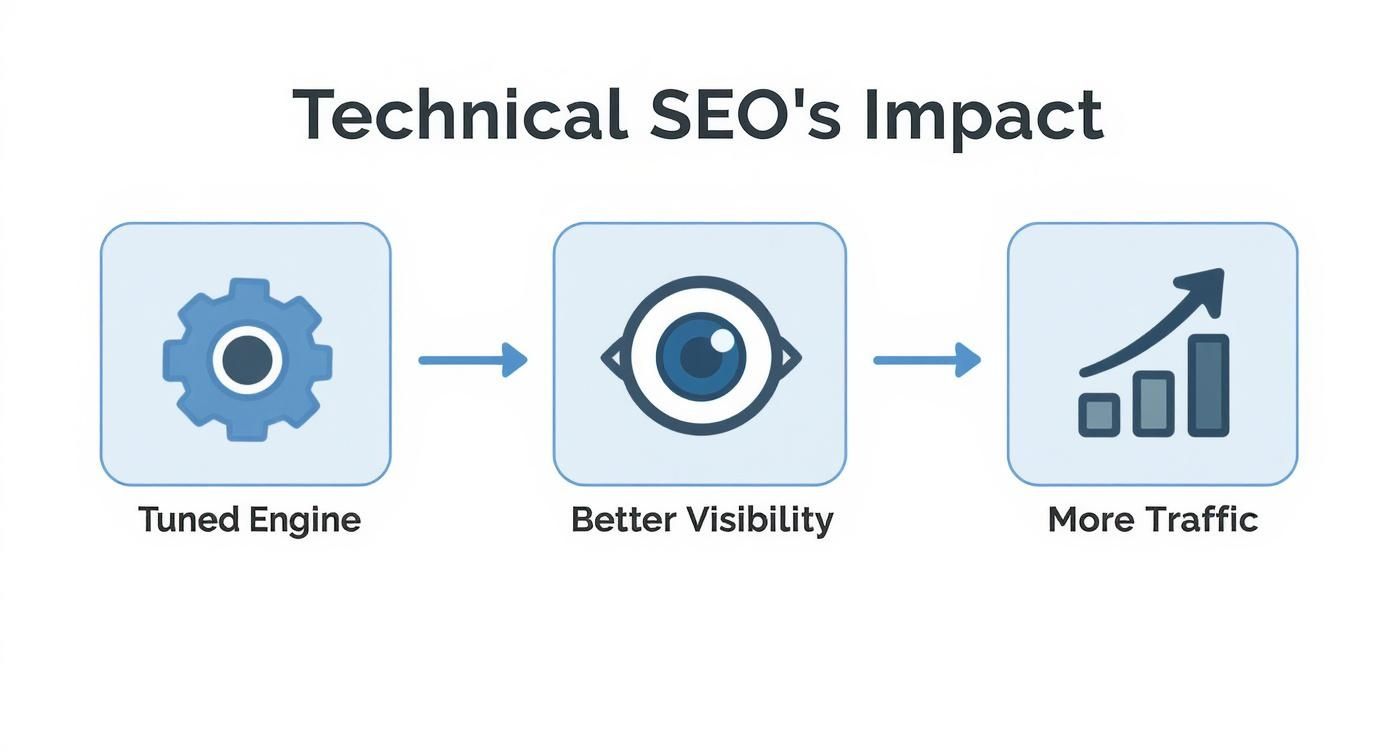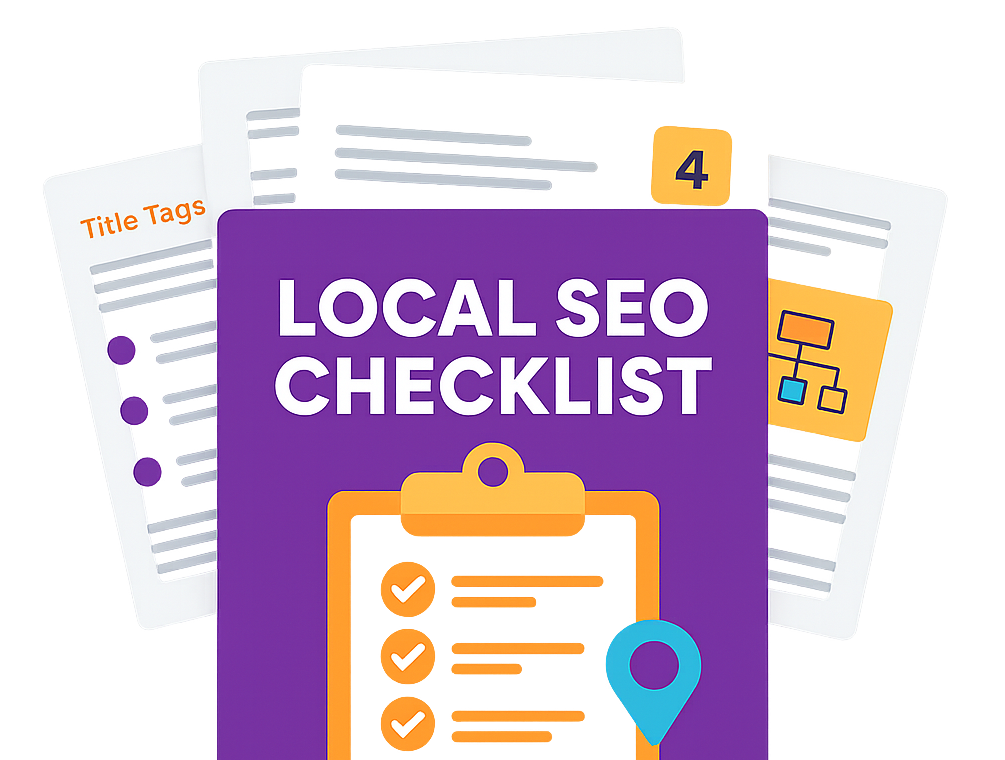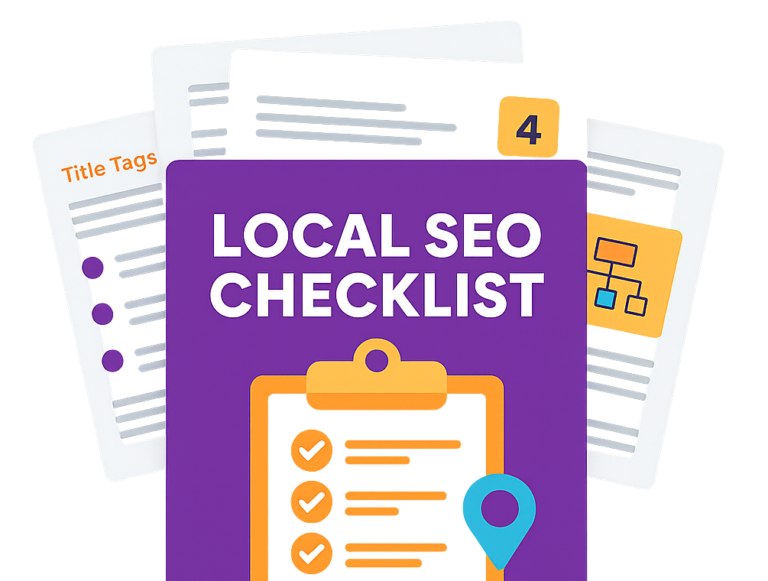Think of a technical SEO consultant as the chief engineer for your website. They don't worry about the paint job (design) or the sales pitch (content). Instead, they’re down in the engine room, making sure everything is running smoothly so search engines like Google can find, understand, and rank your site effectively.
Why Your Website's Technical Health Matters
Imagine you've built the most beautiful, high-performance car. The design is stunning, the interior is luxurious, and it’s packed with features. But if the engine is misfiring or the wheels are misaligned, that car isn’t going anywhere fast.
That’s what technical SEO is for your website. It’s the engine under the bonnet—the hidden foundation that dictates how well your site actually performs in the real world.
A website that’s technically sound is one that search engines can crawl without hitting dead ends. This smooth communication is non-negotiable. If Google's bots (often called "spiders") run into broken links, painfully slow pages, or a confusing structure, they'll struggle to index your content properly. Sometimes, they just give up entirely, leaving your best pages invisible to potential customers. A technical SEO consultant steps in to make sure every nut and bolt is tightened perfectly.
The Foundation for Digital Growth
Ignoring your site’s technical health is like building a gorgeous house on shaky foundations. It might look great for a while, but eventually, the cracks will start to show. No amount of brilliant content or clever marketing can make up for a website that search engines find difficult to process. Technical problems create an invisible ceiling on your growth, stopping you from ever outranking competitors, even if your products are better.
For a deeper look at all the moving parts, our guide on what is technical SEO breaks it all down.
The benefits of getting this right are massive and feed directly into your bottom line:
- Improved Search Engine Crawlability: Making it dead simple for Google to find and index every important page you have.
- Enhanced User Experience: A faster, more reliable website keeps visitors happy and stops them from bouncing away.
- Stronger Ranking Signals: Things like site speed and mobile-friendliness are direct ranking factors that Google cares about. A lot.
- Greater ROI on Content: It ensures the fantastic content you’re creating actually gets seen by search engines and people.
Ultimately, a technical SEO consultant’s job is to hunt down and fix anything that’s holding your website back. A huge part of that is knowing how to improve website performance and loading speed, because even a one-second delay can kill your conversions. Investing in your website’s technical foundation isn’t just about fixing bugs; it’s about building a solid asset for long-term success online.
What a Technical SEO Consultant Actually Delivers
Let's cut through the jargon. When you hire a technical SEO consultant, you're not paying for vague promises—you're investing in tangible services that fix and fortify your website's very foundation. These are specific, high-impact actions designed to make sure search engines can find, understand, and ultimately, rank your site.
Each deliverable builds on the last, creating the bedrock for any successful organic search strategy.
The first and most important step is always a comprehensive technical SEO audit. Think of it like a full diagnostic check on a car before a mechanic even thinks about picking up a spanner. Using specialist tools, the consultant systematically crawls your website, checking its architecture, code, and performance against hundreds of best practices.
This deep dive uncovers the hidden gremlins silently dragging down your rankings. The final report isn't just a list of problems; it’s a strategic roadmap. For a full rundown on what this involves, take a look at our technical SEO audit checklist with 15 essential elements.
Below is a quick overview of the key services you can expect and how they directly benefit your business.
Key Deliverables from a Technical SEO Consultant
| Deliverable | What It Achieves | Business Impact |
|---|---|---|
| Technical SEO Audit | Identifies foundational issues with site health and architecture. | Provides a clear, prioritised roadmap for all future SEO work. |
| Crawlability & Indexability Fixes | Ensures search engines can find and list all your important pages. | Prevents valuable content from being invisible in search results. |
| Advanced Page Speed Optimisation | Improves loading times and user experience, focusing on Core Web Vitals. | Reduces bounce rates and improves rankings, leading to more conversions. |
| Structured Data Implementation | Adds special code (Schema) to help search engines understand your content. | Unlocks "rich results" (e.g., star ratings, prices) that increase click-through rates. |
| Website Migration Support | Manages the technical process of moving to a new domain or platform. | Prevents catastrophic drops in traffic and rankings during a site move. |
Each of these deliverables addresses a critical part of your site's relationship with search engines, ensuring nothing is left to chance.
Improving Site Crawlability and Indexability
Once the audit has flagged the problems, the next job is to make sure search engines can efficiently crawl and index your website. Think of it this way: crawlability is how easily Google’s bots can navigate the corridors of your site, while indexability is their ability to file your pages away in their massive library. If they can’t find a page, it simply won’t show up in search results.
A consultant gets this sorted by:
- Optimising the
robots.txtfile: This file is like a set of instructions for search engine bots, telling them which doors are open and which are closed. It stops them from wasting time on unimportant areas. - Managing XML Sitemaps: A clean, up-to-date sitemap acts as a clear map, guiding bots directly to your most valuable pages.
- Fixing Crawl Errors: Resolving broken links (404s) and server issues ensures a smooth journey for bots and, just as importantly, for your human visitors.
A specialist also provides crucial expertise in mitigating website migration SEO impact. Moving to a new domain or platform without careful planning is a recipe for disaster, and a consultant ensures you don't lose the hard-won authority you've already built.
Advanced Page Speed Optimisation
In an age of dwindling attention spans, a slow website is a killer. It frustrates users and tells Google that your site offers a poor experience. A technical SEO consultant goes way beyond basic fixes, diving deep into advanced page speed optimisation with a laser focus on Google's Core Web Vitals.
These aren't just arbitrary numbers. They are specific metrics that measure a user's actual experience: how quickly your main content loads (Largest Contentful Paint), how soon someone can interact with the page (First Input Delay), and how much the layout jumps around as it loads (Cumulative Layout Shift).
Getting these right is non-negotiable for ranking well today.
Implementing Structured Data
Finally, a key deliverable is implementing structured data, often called Schema markup. This is a special vocabulary of code added to your website's HTML. It doesn't change what a visitor sees, but it acts as a powerful translator for search engines.
This infographic neatly shows how these technical tweaks lead to real-world business results.

As the visual shows, a technically sound website is like a well-tuned engine—it runs efficiently, gets you noticed, and drives more traffic. By explicitly telling Google what your content is about—a product, a recipe, a local business—you boost your chances of getting "rich results." These are the eye-catching search listings with star ratings, prices, and images that practically beg to be clicked.
Measuring the Real Impact of Technical SEO
Technical fixes are all well and good, but what do they actually do for your business? The real value of a technical SEO consultant comes down to their ability to connect those behind-the-scenes improvements to your bottom line. It’s about ditching the vanity metrics and focusing on the numbers that show a clear return on your investment.

The impact isn't always instant, but it is always measurable. When you track the right data, you can draw a straight line from a technical audit right through to increased revenue. This isn't guesswork; it's about linking specific actions to real commercial outcomes.
From Technical Fixes to Commercial Gains
A seasoned consultant knows their job isn’t done until they’ve driven meaningful growth. They obsess over the KPIs that directly influence your success, not the fluffy metrics that look nice on a report but don't move the needle. It means shifting the focus from just boosting traffic numbers to attracting qualified, high-intent visitors—the kind of people who are ready to become customers.
The main metrics that prove the value of technical SEO are:
- Organic Traffic Growth: Not just more visitors, but more of the right visitors who are actively looking for what you sell.
- Keyword Ranking Improvements: We're talking about tracking the rise of your most valuable commercial keywords—the ones that actually lead to sales.
- Reduction in Crawl Errors: A clean bill of health in Google Search Console means search engines can index your site efficiently, making sure your content gets seen.
- Increased Conversion Rate: A faster, smoother website experience directly encourages more visitors to take that next step, whether that’s making a purchase or filling out a contact form.
Tracking these KPIs is non-negotiable. If you need a solid framework for measuring what really matters, our guide on creating a monthly SEO report template is a great place to start.
A Cambridgeshire E-commerce Case Study
Let's put this into practice. Imagine a small Cambridgeshire-based e-commerce shop selling artisanal homewares. Before bringing in a technical SEO consultant, they were struggling with some common but crippling issues.
Their website was painfully slow, taking over six seconds to load key product pages. Worse still, a messy site structure meant Google wasn't even indexing hundreds of their product variations, making them totally invisible in search results.
Before Technical SEO Intervention:
- Average Page Load Speed: 6.2 seconds
- Pages Indexed by Google: 45% of total products
- Monthly Organic Sales: £4,500
- Bounce Rate: 78%
They hired a consultant who got straight to work with a full technical audit and a clear action plan. The first job was to fix the indexation problems by creating a clean XML sitemap and sorting out the internal linking mess. Next up was page speed—optimising images and getting the server to respond faster.
The results were night and day. With all their products finally visible to Google and a much slicker user experience, the website's performance took off.
After Technical SEO Intervention:
- Average Page Load Speed: 2.1 seconds
- Pages Indexed by Google: 98% of total products
- Monthly Organic Sales: £8,200
- Bounce Rate: 45%
This before-and-after story shows a direct link between technical fixes and commercial wins. That 82% increase in organic sales didn't come from a big new marketing push or flashy discounts; it was achieved purely by strengthening the website's technical foundations. This is the tangible, measurable value a specialist technical SEO consultant brings to the table—turning a leaky digital bucket into a powerful, revenue-generating machine for your business.
How Much Does a Technical SEO Consultant Cost in the UK?
Putting money into technical SEO is one of the smartest moves you can make for your website’s future growth. But the big question is always: what’s the budget? The honest answer is that costs can swing pretty widely, depending on what needs doing and how complex your website is.
Getting to grips with the different ways consultants charge is the best place to start. It helps you match your budget to the results you’re after, whether that’s a one-off fix for a critical problem or ongoing support to keep you ahead of the curve.
Common Pricing Models Explained
When you start talking to technical SEO consultants, you’ll find they usually work with a few standard pricing models. Each one is designed for different business needs.
Here are the most common setups:
- Monthly Retainers: You pay a fixed fee each month for continuous support. This is perfect for businesses that need regular health checks, ongoing optimisation, and an expert on hand to react to Google’s algorithm updates.
- Project-Based Fees: If you have a clear, one-off job in mind—like moving to a new website or a full-scale technical audit—a project fee is the way to go. You agree on the cost upfront for a specific set of deliverables.
- Hourly Rates: Some consultants charge by the hour, which works well for smaller tasks, quick consultations, or a bit of training for your team. The rate usually reflects how experienced the consultant is.
For most small to medium-sized businesses, a monthly retainer often delivers the best bang for your buck. It ensures someone is always keeping an eye on your site's technical health and making steady improvements.
What Factors Influence the Cost?
No two websites are the same, so the quote you get will depend on a few key things. The bigger and more complicated the job, the more time and skill it’s going to take.
Think of it like this: servicing a standard family car is straightforward, but fine-tuning a high-performance racing vehicle requires a different level of expertise and time. The same principle applies to your website.
Here’s what typically shapes the price tag:
- Website Size and Complexity: A five-page brochure site is a world away from an e-commerce platform with thousands of products and tricky filtering systems.
- Current Technical Health: A site with deep-rooted, long-standing problems will need a lot more work upfront than one that just needs a quick tune-up.
- Industry Competition: If you’re in a cut-throat market, getting to the top and staying there will demand a much more intensive and sustained effort.
Typical Investment Levels for UK Businesses
So, what should you actually expect to pay? While every project is different, we can look at some general benchmarks for technical SEO services here in the UK.
Below is a table outlining what businesses of different sizes might expect to invest monthly.
Typical UK Technical SEO Retainer Costs by Business Size
| Business Size | Typical Monthly Retainer (GBP) | Common Scope of Work |
|---|---|---|
| Small Business/Startup | £500 – £1,500 | Basic site health monitoring, local SEO fixes, core web vitals improvements, basic reporting. |
| Medium-Sized Enterprise (SME) | £1,500 – £4,000 | Comprehensive technical audits, crawl budget optimisation, on-page SEO, structured data implementation, advanced analytics. |
| Large Business/E-commerce | £4,000+ | International SEO, site migrations, advanced log file analysis, JavaScript SEO, in-depth strategic consultancy. |
As you can see, monthly costs can range from £500 to £1,500 for smaller businesses needing foundational support, while medium-sized companies might invest £1,500 to £4,000 for more in-depth work. You can read the full research about these SEO cost breakdowns to get a clearer picture.
Ultimately, it’s far better to see this as an investment rather than a cost. A technically solid website is the bedrock for all your other marketing efforts. Get it right, and you’ll see a powerful return through better visibility, more traffic, and higher conversions.
How to Hire the Right Technical SEO Consultant
Choosing the right technical SEO consultant can feel like a minefield, but it's a decision that will directly shape your website's performance and, let's be honest, your bottom line. It’s less about hiring a technician and more about finding a strategic partner who gets your business goals.

Don't just jump in. The best approach is a methodical one. First, figure out what success actually looks like for you. Are you trying to squash some known bugs, navigate a tricky website migration, or build a proper foundation for long-term organic growth? Clear objectives are your best filter.
Once you know what you need, you can start separating the wheat from the chaff. A great consultant is transparent, obsessed with data, and focused on commercial results—not just fixing technical issues for the sake of it.
Key Questions to Ask a Potential Consultant
The interview stage is your best chance to spot the real experts. Don’t be shy about digging into their process, their track record, and how they report back. The quality of their answers will tell you everything you need to know.
Here are a few essential questions to get the conversation started:
- What does your initial audit process look like? A confident answer will involve more than one tool and cover all the bases: crawlability, indexation, site speed, and structured data. They should end up with a clear, prioritised action plan.
- Can you share case studies from businesses similar to mine? You're looking for proof they've worked with your platform (like WordPress or Shopify), understand your industry, and have experience with businesses of your size.
- How do you measure and report on success? They need to talk about KPIs that actually move the needle—organic traffic, keyword ranking improvements for money-making terms, and conversion rates. Vanity metrics are a waste of time.
- How do you keep up with Google's algorithm changes? A true pro will be able to chat about recent updates and explain how they've adapted their strategies. You want someone who lives and breathes this stuff.
- What will you need from my team to be successful? This question reveals whether they think collaboratively. They should understand that getting things done often means working with your developers and content team.
Getting straight answers here is non-negotiable. For a deeper dive, our guide on how to choose an SEO agency has even more useful tips.
Red Flags to Watch Out For
Knowing what to look for is only half the battle; knowing what to run from is just as important. Some promises are instant red flags and should set alarm bells ringing. A reputable technical SEO consultant will keep your expectations grounded in reality.
Be very wary of anyone who:
- Guarantees #1 rankings: Nobody can promise a specific spot on Google. This is the oldest trick in the book, and it usually points to outdated, risky tactics.
- Is secretive about their methods: A genuine partner is an open book. If they start talking about a "secret sauce" or proprietary techniques, it’s time to walk away.
- Lacks a data-driven approach: Every recommendation should be backed by cold, hard data from tools like Google Search Console, Google Analytics, and professional site crawlers.
- Focuses solely on technical jargon: Yes, the work is technical, but a great consultant can break down complex problems and explain their business impact in plain English.
A true expert isn't just a technician; they are a strategic partner. Their goal should be to align their technical recommendations with your broader business objectives, ensuring every action contributes to measurable growth.
The best UK agencies know this, which is why they have specialists dedicated to this craft. Top-tier agencies often provide tailored services like in-depth technical audits and Core Web Vitals optimisation specifically for UK audiences. This specialisation is crucial, especially when you consider that in 2025, an estimated 89% of UK consumers will use search engines to find local businesses, showing a direct line between technical health and revenue.
Taking the time to find the right consultant isn't just an expense; it's an investment that will pay for itself many times over.
What’s the Next Step?
We’ve spent this guide pulling back the curtain on the engine room of your website. It's become clear that a technically sound foundation isn’t just a ‘nice-to-have’—it’s the absolute bedrock of any digital marketing that actually gets results. This is the unseen work that lets your brilliant content and sharp design truly shine, making sure search engines can find, understand, and ultimately reward you.
For any business serious about competing online, investing in technical health is non-negotiable. From site speed and crawlability to structured data, every piece of the puzzle matters. A specialist technical SEO consultant is the person who makes sure all those pieces fit together perfectly, removing the invisible roadblocks holding you back.
Build Your Site on Solid Ground
Think of it this way: technical SEO creates the right conditions for sustainable growth. It ensures every pound you put into creating content or running marketing campaigns delivers the best possible return. Without that solid base, your efforts are like shouting into the wind—powerful, but completely unheard.
A technically healthy website delivers on several key business goals:
- It builds trust with search engines, which leads to better, more reliable visibility.
- It creates a far better user experience, which means lower bounce rates and more conversions.
- It future-proofs your digital presence against the next big algorithm update or a new competitor.
Fixing the foundations is always the first, most critical step toward winning in your market. It’s about turning your website into an asset that works for you 24/7.
A technically sound website doesn't just rank better; it converts better. By removing friction for both search engine bots and human visitors, you create the shortest possible path from a Google search to a sale.
Take Action with a Free SEO Health Check
Understanding the theory is one thing, but seeing exactly how it applies to your website is another. That’s why we invite businesses in Cambridgeshire and beyond to take the next logical step with our complimentary, no-obligation SEO Health Check.
We’ll run an initial analysis of your site to pinpoint the most critical technical issues hurting your performance right now. There's no hard sell, just clear, actionable insights from an expert who knows what to look for.
After the health check, you'll have the option to request a fully tailored Activity Plan. This isn't a generic template; it's a bespoke document outlining precisely what needs doing, why it's important, and how each action will help you hit your business goals. It’s the strategic roadmap you need to turn technical fixes into real commercial success.
Ready to unlock your website's true potential? Claim your free SEO Health Check from Bare Digital today and discover your path to greater visibility and growth.
Still Got Questions?
It's completely normal. The world of technical SEO can feel a bit like looking under the bonnet of a car for the first time—lots of moving parts. Here are some straightforward answers to the questions we hear most often.
What’s the Difference Between Technical and General SEO?
Think of it like building a house. General SEO is the interior design—the great content, the blog posts, and the backlinks from other websites. It’s all the stuff that makes your site look appealing and feel authoritative to visitors.
Technical SEO, on the other hand, is the foundation and the wiring. It’s the behind-the-scenes work covering site speed, crawlability, and mobile-friendliness. A technical SEO consultant makes sure the structure is solid so search engines can easily find and understand your content, and your visitors have a flawless experience. You absolutely need both, but a wonky foundation will undermine even the best interior design.
A website with brilliant content but poor technical health is like a beautiful shop with a permanently locked door. No matter how good the products inside are, no one can get in to see them.
How Long Does It Take to See Results?
This is the big one, and the honest answer is: it’s a long-term investment, not a quick fix. While some immediate improvements, like fixing critical crawl errors, can send positive signals to Google within a few weeks, the real impact on your rankings and traffic takes time to build.
You should expect to see meaningful, measurable progress within three to six months. This window gives us enough time to implement the fixes, for Google to come back and re-evaluate your site, and for those positive changes to start translating into better performance. It’s all about building sustainable growth, not chasing overnight wins.
What Should I Expect During the Onboarding Process?
A smooth start sets the tone for a great partnership. When you begin working with a technical SEO consultant, the first phase is all about discovery, alignment, and planning.
Here’s what that typically looks like:
- Kick-off Meeting: We’ll have an initial chat to get on the same page about your business goals, who you’re trying to reach, and what success looks like to you.
- Access & Permissions: The consultant will need a look under the hood. This means getting access to tools like Google Analytics, Google Search Console, and your website’s backend (the CMS).
- The Deep-Dive Audit: This is where the real work begins. Your consultant will perform a comprehensive technical audit to uncover every single issue and opportunity for improvement.
- Strategy & Roadmap: Based on the audit, you’ll get a prioritised action plan. It’s a clear roadmap that outlines exactly what needs fixing, in what order, and the impact you can expect from each change. No jargon, just a clear path forward.
Ready to stop guessing and start seeing real improvement? At Bare Digital, we bring the clarity and expertise you need to turn your website into a powerful growth engine. It all starts with our complimentary, no-obligation SEO Health Check, where we’ll pinpoint your biggest opportunities.








